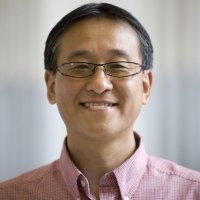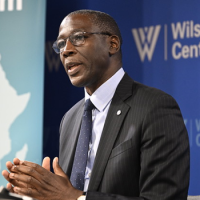A Forum on Africa and China: What's at Stake
Steve McDonald, Director; Africa Program and Project on Leadership and Building State Capacity
Darius Mans, President and CEO; Africare
Robin Sanders, International Affairs Advisor and Communication and Outreach Director; Africare
Melvin P. Foote, President; Constituency for AfricaOn February 4, 2011 the Wilson Center's Africa Program and Project on Leadership and Building State Capacity hosted an event entitled, "Africa & China: What's at Stake: A Look at Development, Economic and Business Issues" in partnership with Africare and the Constituency for Africa.
After opening and welcoming remarks by the event co-sponsors, Ngozi Okonjo-Iweala, Managing Director at the World Bank, gave the opening Keynote address. She entreated attendees to understand that the debate regarding whether or not China should be investing in African countries was moot. China is already Africa's second largest trading partner behind the European Union (EU). Last year through the World Bank, China made substantial contributions to the organization's replenishment of $49.3 billion, half of which went to Africa. Therefore, Okonjo-Iweala posited that it is more pertinent to consider how this relationship can be mutually beneficial. She implored African leadership to work with China on an equal footing, and to be clear about what they want out of this relationship.Okonjo-Iweala recognized that China has a long-term strategy for building relations with a continent that it sees as strategically important. However, she questioned whether African countries have a strategy for China. In conclusion, Okonjo-Iweala called for an investment code for China in Africa that observes five core principles: an alignment of investment with the host country's development priorities, transparency, value chain development, refusal of bribe payments, and local community engagement.
Robin Sanders, International Affairs Advisor and Communication and Outreach Director with Africare, set the scene and introduced the panel discussions. She said that the goal of the Forum would be to give an overview of development and business aspects of the China-Africa relationship. This is particularly relevant in light of the fact that China now has the second largest economy in the world. Sanders proceeded by stating that Sub-Saharan Africa is a key emerging market with 20 of the region's 37 economies expanding. Moreover, the rate of return in Sub-Saharan Africa is greater than any other area of development, and by 2020 the potential annual revenue could reach as much as $2.3 trillion.
The first panel, focused on the current status of China's presence in Africa, was opened by Florizelle Liser, Assistant US Trade Representative for Africa, and she discussed the economic implications of China's growing presence on the continent. Liser asserted that trade between China and Africa is largely resource-based. Although China offers African countries trade preferences, changes are needed in investment if Africa is going to produce value-added goods and capture more than 3% of world trade.Wenran Jiang, Chair of Mactaggart Research, presented the topic of Chinese perceptions of transparency in Africa. Jiang urged that matters of transparency be considered in the context of Chinese domestic policies. In terms of business, China does not conduct itself differently at home than it does in Africa.
Robert Tansey, Policy Directory of the Nature Conservancy, spoke regarding the challenges of achieving development while protecting the ecosystem. Tansey's organization uses a tool called, "Development by Design" that helps guide infrastructure projects.Raymond Gilpin, Associate Vice President at the United States Institute for Peace, discussed strategic investments and regional stability in the context of an enhanced economic relationship between Africa and China. Gilpin spoke regarding the impact of resource-backed loans, ‘package deals' and forecasted that, "should African countries become more prolific in terms of exports, they will become China's competitors."
The second panel, focused on the future of China-Africa relations, was moderated by Stanley L. Straughter, Chairman of the Board of Directors for the Constituency for Africa. David Shinn, Professor at the Elliot School of Foreign Affairs, opened the panel by discussing how Africa should fit in the US-China dialogue. Shinn argued that Chinese and American interests, vis-à-vis African countries, are similar: oil imports; African support in regional & international forums; military flyover and landing rights; export expansion; and the minimization of terrorist threats, money laundering, drug trafficking, and piracy. This has not led to competition yet, but it has not led to cooperation either.
Nii Akuetteh, Professor at Georgetown University, discussed the best model for economic development in Africa. Akuetteh charged that the future of Africa's economic development is too important to leave to governments alone and that civil society (the media, universities, and research institutions) must play an essential role in guiding this discussion.
Wale Adeosun, Chief Investment Officer at Kuramo Capital Management, presented his observations as an investor in China and Africa. Adeosun argues that the increased demand from Brazil, Russia, India and China are fueling economic growth.
Sharon T. Freeman, author and publisher, spoke of China's development strategy in an African context. More than having a strategy for engaging African countries, Freeman asserts, the Chinese have "marching orders" and all members of government understand their role and how they fit into the equation.Donald Yamamoto, the Senior Deputy Assistant Secretary of State for Africa, gave a closing Keynote address at the lunch that followed the panel discussions. He characterized US-China relations, with respect to Africa, as one of shared interests and potential for expanded cooperation. Yamamoto spoke of the imperatives of the US and China finding common ground so as to benefit Africa and her people. He said that, "It is estimated that if Africa grows by just one percent of total world trade it would realize a $70 billion dollar trade growth, nearly three times more than the total amount of foreign aid to Africa." However, Yamamoto acknowledged that there remain areas of disagreement between the two countries, specifically those of promoting basic industrial production, trade policy, and participation in multilateral donor organizations. Finally, Yamamoto charged that the concessionary loan packages which China gives to African countries, steeps them in indebtedness, at a time when international donors have forgiven their debts under the HIPC initiative.
Speakers

Project Director, Canada-China Energy and Environment Forum, Special Advisor to Alberta Minister of Energy, and Senior Fellow of Asia Pacific Foundation of Canada, Canada


Hosted By

Africa Program
The Africa Program works to address the most critical issues facing Africa and US-Africa relations, build mutually beneficial US-Africa relations, and enhance knowledge and understanding about Africa in the United States. The Program achieves its mission through in-depth research and analyses, public discussion, working groups, and briefings that bring together policymakers, practitioners, and subject matter experts to analyze and offer practical options for tackling key challenges in Africa and in US-Africa relations. Read more
